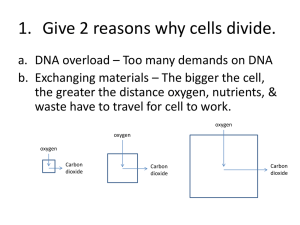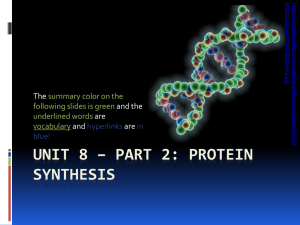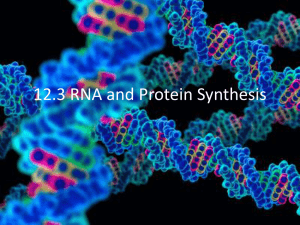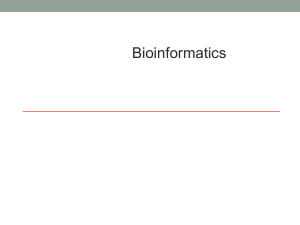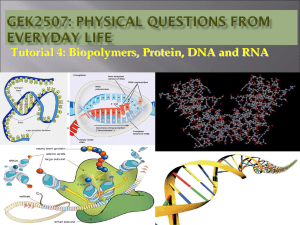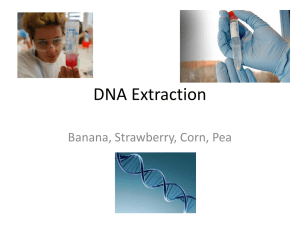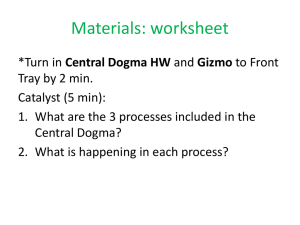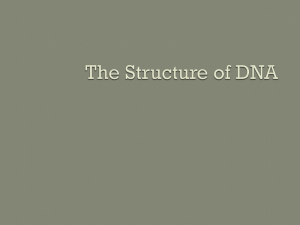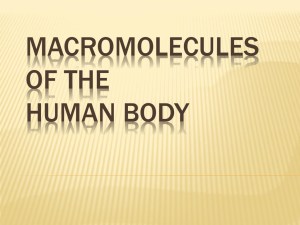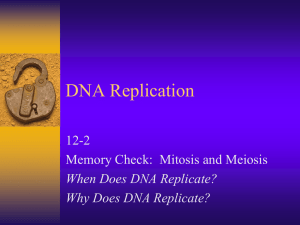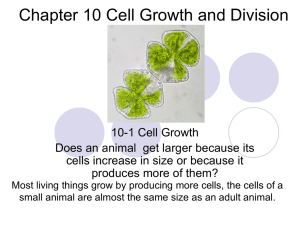File
advertisement
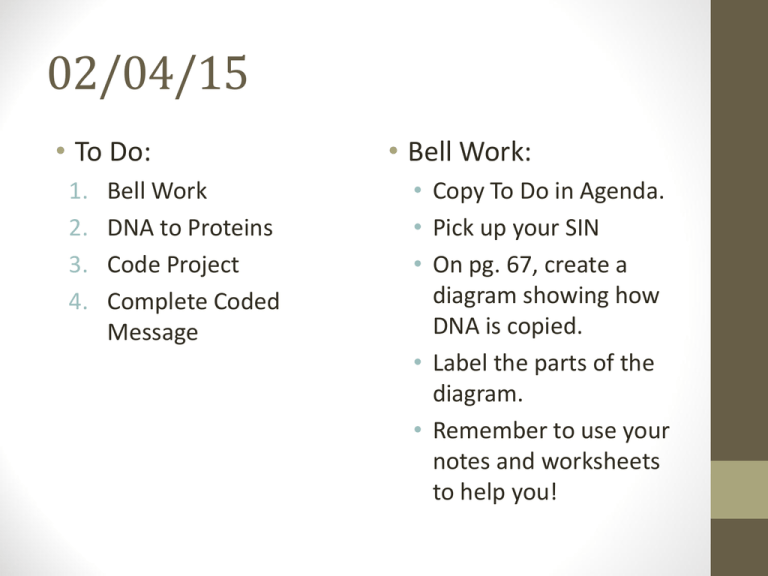
02/04/15 • To Do: 1. 2. 3. 4. Bell Work DNA to Proteins Code Project Complete Coded Message • Bell Work: • Copy To Do in Agenda. • Pick up your SIN • On pg. 67, create a diagram showing how DNA is copied. • Label the parts of the diagram. • Remember to use your notes and worksheets to help you! Announcements • Procedure Changes: • No more test corrections, but retakes will be available. • Students who have a C- or below will receive after school detention on Thursdays to provide time for improvement (assignment corrections, test retakes, complete missing work, etc.). • You, your parents, and the administration will be notified. • No Late Work without Mac Pass! • You have 4 for the semester, use them! • Complete them well, or you don’t get full credit. • May not use the last two weeks of the quarter. The DNA Connection • • Notes on pg. 70 of SIN. How do we go from DNA to who we are? • • • DNA codes for proteins. Proteins are what make us different. Think about blood type. Hot Pockets and DNA to Proteins • What is a hot pocket? • As we watch, take notes on the video. • Notes are on how DNA codes for proteins. The DNA Connection • What are the steps for going from DNA to protein? 1. DNA is copied into RNA – What is the difference between RNA & DNA? – DNA has a T where RNA has a U 2. RNA is then transcribed into protein. – Each three bases code for an amino acid. – These three bases are called a codon. – A change in the code will cause a mutation in the protein made. Differences between RNA and DNA • RNA • Ribose sugar • Single-stranded • Contains uracil instead of thymine • Make proteins DNA Deoxyribose sugar Double stranded Contains thymine Directs cell activities Types of RNA 1. Messenger RNA: carry instructions for how to assemble amino acids into proteins 2. Ribosomal RNA: help make ribosomes 3. Transfer RNA: transfers each amino acid to the ribosome Types of RNA Transcription • RNA is made by copying part of a nucleotide sequence of DNA • RNA polymerase binds to DNA and separates the strands and uses one strand to make a new strand of RNA • Promoters: RNA polymerase will only bind to the regions of the DNA strand known as promoters RNA Editing • Introns: sequences of DNA nucleotides that are not involved in coding for proteins • Exons: DNA sequences that code for proteins • RNA is edited by cutting out the introns and splicing the exons together The Genetic Code • There are 20 amino acids • Proteins are made by joining amino acids in chains called polypeptides • Codon: consists of three consecutive nucleotides that specify a single amino acid. Translation • Takes place in the ribosomes • The cell uses the information from messenger RNA to produce proteins Steps of Translation • 1. mRNA is transcribed from DNA in the nucleus and released into the cytoplasm • 2. An mRNA molecule attaches to a ribosome. As each codon of the mRNA molecule moves through the ribosome, tRNA brings the proper amino acid into the ribosome to add to the polypeptide chain Steps of translation continued 3. 4. The ribosome forms a peptide bond between the first and second amino acids The polypeptide chain grows until the ribosome meets a stop codon The Roles of RNA and DNA • DNA stays in the nucleus • DNA makes RNA • RNA travels to the ribosomes • RNA makes proteins Genes and Proteins • Most genes contain instructions for assembling proteins • Many proteins are enzymes that control chemical reactions • Proteins are specifically designed to build or operate a component of the living cell Review DNA to Protein Review • Complete Review WSs and tape to pg. 69 of your SIN. The DNA Connection • Creating your own code based on the genetic code and write a letter in it: 1. 2. 3. 4. Assign each codon to a letter, type of punctuation, and anything else you need for writing a letter. You will need to include codes for spaces and the end of sentences. It should have perfect grammar. You will have three things when you are finished: a. b. c. A letter written completely in code. A decipher sheet for decoding your letter. The original letter before it was coded.
